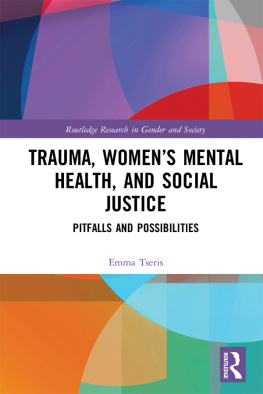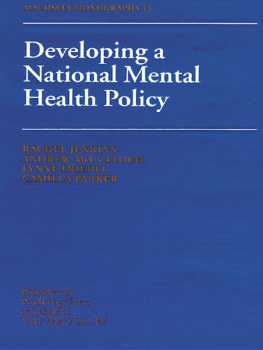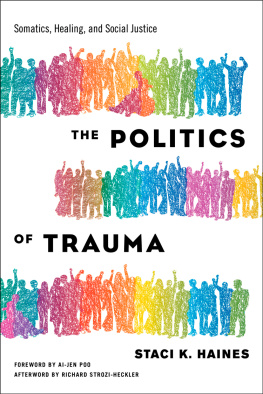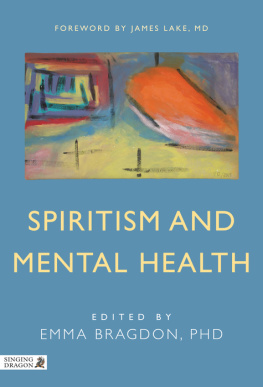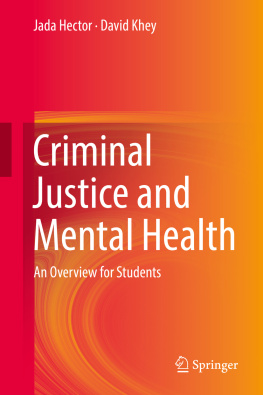Trauma, Womens Mental Health, and Social Justice
This book argues that while notions of trauma in mental health hold promise for the advancement of womens rights, the mainstreaming of trauma treatments and therapies has had mixed implications, sometimes replacing genuine social change efforts with new forms of female oppression by psychiatry. It contends that trauma interventions often represent a business as usual approach within psychiatry, with women being expected to comply with rigid treatment protocols, accepting the advice given by trauma experts that they are mentally unstable and that they must learn to manage the effects of violence in the absence of any real changes to their circumstances or resources. A critique of trauma treatment in its current form, Trauma, Womens Mental Health, and Social Justice recommends practical steps towards a socio-political perspective on trauma which passionately re-engages with feminist values and activist principles.
Emma Tseris is a Lecturer in Social Work and Policy Studies at the University of Sydney, Australia, where her research and teaching areas include critical mental health theory, mental health and gender inequality, and narrative research methodologies.
Routledge Research in Gender and Society
Masculinities, Sexualities and Love
Aliraza Javaid
Body, Migration, Re/constructive Surgeries
Making the Gendered Body in a Globalized World
Edited by Gabriele Griffin and Malin Jordal
Gender and Migration
Intersectional Prospects
Anna Amelina and Helma Lutz
Gender and Precarious Research Careers
A Comparative Analysis
Edited by Annalisa Murgia and Barbara Poggio
Prostitution, Pornography and Trafficking in Women
Israels Blood Money
Esther Hertzog and Erella Shadmi
Mexican American Women, Dress and Gender
Pachucas, Chicanas, Cholas
Amaia Ibarraran-Bigalondo
Trauma, Womens Mental Health, and Social Justice
Pitfalls and Possibilities
Emma Tseris
Wellness in Whiteness
Biomedicalisation and the Promotion of Whiteness and Youth among Women
Amina Mire
For more information about this series, please visit: www.routledge.com/sociology/series/SE0271
Trauma, Womens Mental Health, and Social Justice
Pitfalls and Possibilities
Emma Tseris
First published 2019
by Routledge
2 Park Square, Milton Park, Abingdon, Oxon OX14 4RN
and by Routledge
52 Vanderbilt Avenue, New York, NY 10017
Routledge is an imprint of the Taylor & Francis Group, an informa business
2019 Emma Tseris
The right of Emma Tseris to be identified as author of this work has been asserted by her in accordance with sections 77 and 78 of the Copyright, Designs and Patents Act 1988.
All rights reserved. No part of this book may be reprinted or reproduced or utilised in any form or by any electronic, mechanical, or other means, now known or hereafter invented, including photocopying and recording, or in any information storage or retrieval system, without permission in writing from the publishers.
Trademark notice: Product or corporate names may be trademarks or registered trademarks, and are used only for identification and explanation without intent to infringe.
British Library Cataloguing-in-Publication Data
A catalogue record for this book is available from the British Library
Library of Congress Cataloging-in-Publication Data
Names: Tseris, Emma, author.
Title: Trauma, womens mental health, and social justice : pitfalls and possibilities / Emma Tseris.
Description: Abingdon, Oxon ; New York, NY : Routledge, 2019. | Series: Routledge research in gender and society ; 77 | Includes bibliographical references and index.
Identifiers: LCCN 2018055750 (print) | LCCN 2018058920 (ebook) | ISBN 9781315107820 (eBook) | ISBN 9781138091801 (hardback) | ISBN 9781315107820 (ebk)
Subjects: | MESH: Psychological Trauma | Womens Healthtrends | Social Justice | Feminism
Classification: LCC RG103.5 (ebook) | LCC RG103.5 (print) | NLM WM 172.5 | DDC 616.890082dc23
LC record available at https://lccn.loc.gov/2018055750
ISBN: 978-1-138-09180-1 (hbk)
ISBN: 978-1-315-10782-0 (ebk)
Typeset in Times New Roman
by Apex CoVantage, LLC
This book is dedicated to the many courageous and intelligent women who have shared their knowledge with me over the past few years, whether in a research interview or a less formal conversation, in order that I might see the silences, flaws, and ongoing limitations within the frameworks that have been positioned as best practice in mental health. I hope that this book captures some of your hopes about the broad system changes required in order for justice to become possible.
I wish to acknowledge the traditional owners of the land on which I work and live, the Gadigal people of the Eora Nation; to recognise the invaluable contributions of Aboriginal and Torres Strait Islander knowledges relating to social and emotional wellbeing; and to pay respect to Aboriginal and Torres Strait Elders past, present, and emerging.
Contents
Despite compelling critiques of patriarchal power and the emergence of incisive strategies to address gender inequality in contemporary times the #MeToo movement being a prominent example that emerged during the writing of this book we nonetheless continue to live in perilous times for women and children. The multitude of social developments made possible by feminist thinking continue to face almost constant backlash, as feminist concerns are simultaneously trivialised and de-politicised (Benton-Grieg, Gamage, & Gavey, 2018). On the other side of this argument, of course, sits the notion that feminism has always faced hostility; its demands have persistently drawn into question the existing order of things, and consequently its future has always been precarious and uncertain. Keeping these contestations in mind, within this book feminist theory is utilised as a framework to critically explore the contemporary shift within mental health discourses towards accounting for and responding to the effects of gender-based violence on mental wellbeing. Looking specifically at the consequences of the emergence and growth of the trauma paradigm as a way of making sense of mental distress, the book aims to explore how the experiences of women who come to the attention of psychiatric services, either during or following exposure to gender-based violence, are shaped by trauma discourses. In doing so, it offers an analysis of both the transformative and empowering capacity of trauma-informed practices, as well as their potentially delimiting and oppressive implications for women.
In the past two decades, numerous books on the usefulness of trauma principles within mental health services have become available. While Trauma, Womens Mental Health, and Social Justice will cover some familiar territory for the readers of such titles, it offers a different analysis to the majority of the available literature on trauma: through utilising the lenses of critical mental health theory and feminist analysis, it provides an in-depth exploration of the notion that the contemporary use of the trauma paradigm within mental health services is connected to a progressive social justice project. Its overarching aim is to explore the social and political consequences of the increasing prominence of the trauma paradigm as a guiding framework within mental health services. In doing this work, the book engages critically with the widespread assumption that trauma-informed practices are inherently or necessarily aligned to feminist aims, and in turn, the empowerment of women within mental health settings. Throughout its analysis, the book attempts to consider the real-world implications of the trauma paradigm on the lives of women who come to the attention of mental health services. In particular, the book explores how trauma-informed ideas and practices have, in the past quarter of a century, moved from marginal to mainstream concepts informing mental health service provision, and it considers the array of potential consequences of this shift for women accessing mental health and therapeutic support. Thank you for picking up this book and engaging with these concerns, which I hope that we can start to examine collectively. Please be in touch if you would like to share some ideas or responses. It would be wonderful to start to think together about some creative ways to engage in conversations about trauma, violence, gender, mental health, and social justice.


